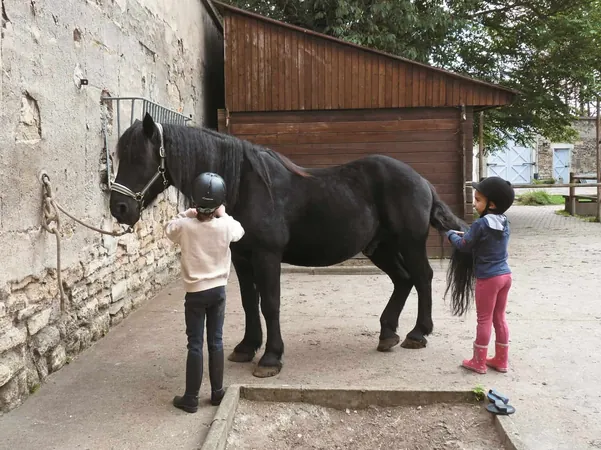
Shocking Discovery: Equine-Assisted Therapy Horses Exhibit Unprecedented Sensitivity to Touch!
2024-11-15
Author: Arjun
Groundbreaking Study on Therapy Horses
In a groundbreaking study conducted by French behavior researchers, a startling revelation has emerged about horses used in equine-assisted intervention (EAI) programs. Unlike typical riding school horses, these therapy horses demonstrate significantly heightened sensitivity to physical contact, which may mean they experience discomfort from the very touch meant to help them relax. This phenomenon raises important questions about the welfare of therapy animals and the methods employed in human-animal interactions.
Research Details and Findings
The study, led by Dr. Martine Hausberger from the Laboratory of Animal and Human Ethology at the French National Research Center and the University of Rennes, noted that the tactile sensitivity in therapy horses was most pronounced in areas usually brushed or touched during interactions with humans, particularly those with mental and developmental disabilities. This suggests a critical need for therapists to adjust their touch techniques to enhance the comfort and welfare of their equine partners.
Insights from Dr. Hausberger
Hausberger remarked, "We often assume that horses enjoy physical contact, but our findings indicate that this is not always the case. During therapy sessions, which often prioritize touch, the horses might actually dread the constant attention." Instead, she suggests that many participants may benefit from interactions that rely more on visual contact rather than obligatory physical touches.
Testing Tactile Reactivity
To understand these dynamics, researchers assessed tactile reactivity by testing 60 horses across two riding centers in France, comparing the responses of EAI horses with those from traditional riding school programs. Utilizing a specialized device known as von Frey filaments, the scientists measured the horses' reactions to gentle touches on various body parts, such as the chest and stifle. The results revealed that EAI horses exhibited more than double the tactile sensitivity to lighter touches compared to their riding school counterparts.
Grooming Preferences and Their Implications
Interestingly, only full-time EAI horses showed significant differences in sensitivity levels, while those involved in a mix of activities reacted similarly to riding school horses. With regards to grooming preferences, the study further examined how people with disabilities interacted with the horses. It was discovered that these individuals tended to brush the hindquarters significantly more than those without disabilities, who kept their focus toward the front.
Rethinking Therapy Approaches
Hausberger suggests that understanding these grooming habits is crucial. "It's possible that the heightened sensitivity observed in EAI horses stems from the nature of how they are handled," she stated. This challenges the notion that therapy horses are inherently more tolerant, and hints at the necessity of adopting alternative methods for interaction, including less tactile engagement or even observational roles.
Call to Action for Therapy Handlers
In light of these findings, there is a strong push for therapy handlers and therapists to rethink their approaches when it comes to physical contact with horses. The implications are profound: improving the welfare of therapy horses might require them to handle physical contact more judiciously. "We must closely monitor each horse's reactions and adapt our techniques accordingly," Hausberger urged.
Conclusion and Future Insights
This study, aptly titled "Horses’ Tactile Reactivity Differs According to the Type of Work: The Example of Equine-Assisted Intervention," was published in the prestigious journal Veterinary Sciences in February 2023. As EAI programs continue to grow in popularity, ensuring the wellbeing of therapy horses must be a top priority for practitioners and enthusiasts alike.
Could this discovery change the way equine therapy is conducted? Stay tuned for more insights as the conversation unfolds!




 Brasil (PT)
Brasil (PT)
 Canada (EN)
Canada (EN)
 Chile (ES)
Chile (ES)
 España (ES)
España (ES)
 France (FR)
France (FR)
 Hong Kong (EN)
Hong Kong (EN)
 Italia (IT)
Italia (IT)
 日本 (JA)
日本 (JA)
 Magyarország (HU)
Magyarország (HU)
 Norge (NO)
Norge (NO)
 Polska (PL)
Polska (PL)
 Schweiz (DE)
Schweiz (DE)
 Singapore (EN)
Singapore (EN)
 Sverige (SV)
Sverige (SV)
 Suomi (FI)
Suomi (FI)
 Türkiye (TR)
Türkiye (TR)